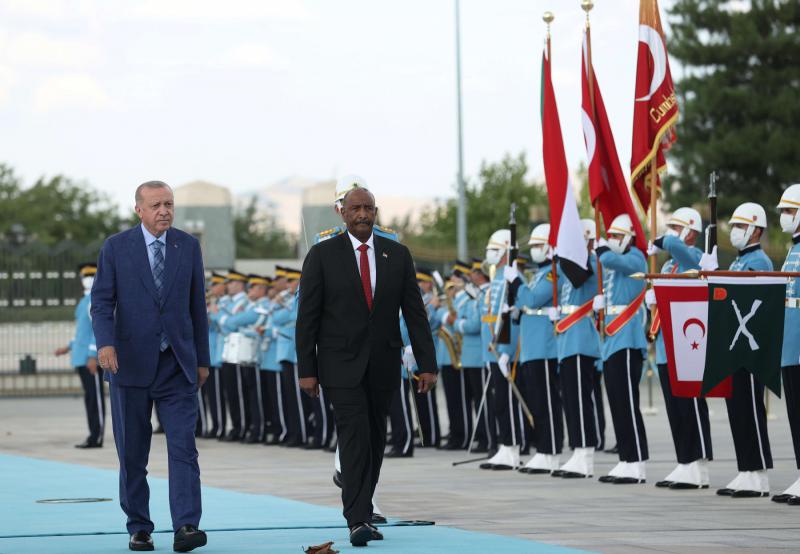ANKARA–Sudan is trying to correct the course of its relations with Turkey and overcome a period of about two years of political estrangement as Ankara also seeks to improve relations with regional partners, Egypt, Saudi Arabia and the UAE.
The head of the Sudanese Transitional Sovereignty Council, Abdel-Fattah Al-Burhan, visited Turkey, Thursday and Friday, at the invitation of Turkish President Recep Tayyip Erdogan.
Burhan held a meeting Friday in Ankara, attended by Turkish Vice President Fuat Oktay, with businessmen and investors. The Sudanese leader expressed his confidence in the possibility of raising the volume of trade with Turkey to two billion dollars.
In relations with Turkey, Sudan is following in the footsteps of its improved relations with Qatar. Ties with Doha had witnessed major developments following the Al-Ula summit in Saudi Arabia of last January, which reset the course of relations between Qatar and the Arab quartet.
Observers say that Burhan had been concerned about the results of the visit paid by his deputy, Lieutenant General Mohamed Hamdan Daglo, to Turkey before the end of last May, in which he obtained material and moral support and an understanding with Ankara to sign some agreements beyond his official prerogatives.
Burhan is said to have feared that his deputy’s approach would spark speculations about the existence of a conflict between the two of them or that Ankara has managed to establish special ties with Daglo.
Observers add that the President of the Sovereignty Council wants to seize control of foreign affairs, especially in dealing with major issues, even if he is willing to leave some of the details to the transitional government.
Burhan’s visit coincides with apparent changes in Turkish discourse regarding its ideological positions. Ankara has cut its level of support to the Islamists of Sudan, which makes the Sovereignty Council less reserved about cooperation and more willing to seek Turkish-Sudanese common areas of interest based on strategic interests.
A member of the Council of Transitional Period Partners in Sudan, Youssef Mohamed Zain, stressed that the visit aims to put an end to the issues of concern that have prevented the establishment of normal relations between the two countries. On top of these issues is Ankara’s support for the Islamist movement in Sudan. There is a tendency, he said, in the Sovereignty Council to demand a halt to that kind of support in exchange for facilitating investment opportunities for Turkey in Sudan.
Although Burhan’s visit has had an economic focus, security and political issues could not be ignored as Khartoum seeks to strike a balance between Ankara’s desire to pursue investments in Sudan and Khartoum’s desire to make sure there are no security threats originating from Turkey.
The spokesman for the Arab Coalition for Sudan, Suleiman Sari, said that talk about establishing normal diplomatic relations with Turkey needs to wait a little because Ankara harbours a number of “enemies of the Sudanese revolution” who belong to the Muslim Brotherhood. There are also Turkish investors in Sudan who are wanted at home but have not been extradited, he pointed out.
He explained to The Arab Weekly that Sudanese official silence on Turkish interference raises several questions and indicates that there are parties within the Sudanese interim authority who are keen on protecting Turkish interests.
Among its many other considerations, Khartoum wants to avoid a confrontation with Ankara and convince it to reduce its support for Ethiopia, regional rival of Sudan.
Analysts believe the president of the Sovereignty Council is also trying to take advantage of regional and international overtures to achieve political and economic gains that could strengthen his hold on power at home and smooth relations of his country abroad.
Source: Arab Weekly
***Show us some LOVE by sharing it!***



